“Grammar is like an interesting puzzle”
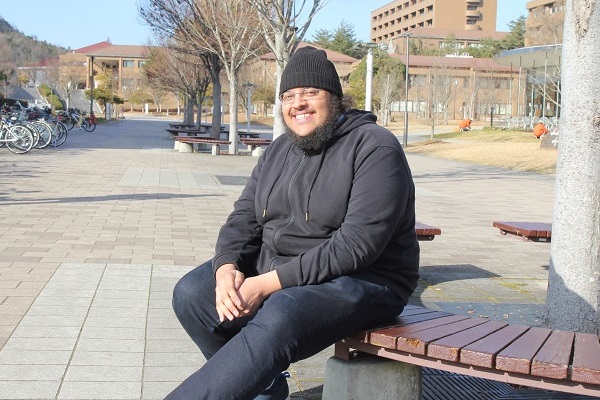
Name: Abubacar Hydara
Home Country/Region: Sweden
Affiliation: Japanese Language and Culture Studies Program (Morito Institute of Global Higher Education)
Hobbies: Watching sports, learning histories, idol culture, hanging out with people
(Date of Interview: January 22, 2019)
Tell us about your hometown.
I am from Stockholm, the capital of the Kingdom of Sweden located on the Scandinavian Peninsula in Northern Europe. My mother is Swedish, and my father is from the Republic of The Gambia in Africa and used to be a professional soccer player.
When we talk about Northern Europe, I suppose the first thing that cross the mind of most Japanese people is "midnight sun". But I’m sorry to have to disappoint you with the fact that there is no complete midnight sun in Stockholm. So, if you want to experience it for sure, make sure to visit the cities in the north.
But still, there is a big difference in the climate between Stockholm and Japan. In winter when it snows, the weather will be cloudy and we hardly see the sun for a couple of weeks. And finally when we see the sun, we will go like “Yo! It has been some time!” to the sun (laughter). So, it is normal to see children playing outside in the dusk. Can you imagine a world of white and grey twilight all over? Well, that’s where we live.
Stockholm becomes the world’s center of attention in December every year.
Yes, Nobel Prize award ceremony is held on December 10th to commemorate Swedish chemist, Alfred Nobel's death. The period when the award ceremony and functions are held is called the “Nobel Week”, and you can see reporters from many countries come flooding in to Stockholm. I had studied at Stockholm University till last year. Each laureate is required to give a public lecture on a subject related to the topic of their prize and it’s called the Nobel lectures. The Nobel lectures were held in the Aula Magna Hall in Stockholm University. I had the opportunity to attend the lectures several times. I attended the lectures by the laureates who invented the blue LED from Japan (*) too.
*Prof. Isamu Akasaki (Meijo University), Prof. Hiroshi Amano (Nagoya University) and Prof. Shuji Nakamura (University of California, Santa Barbara) were awarded the Nobel Prize in Physics in 2014 for the invention of the blue LED.
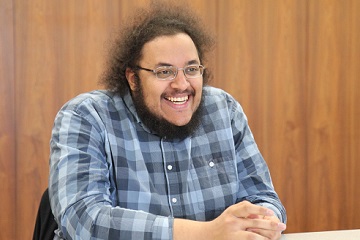
I believe it is an honor to have the Nobel lectures held in your alma mater. By the way, the National Center Test for University Admissions was held last weekend (Jan. 19 & 20) in Japan. How is entrance exam held in Sweden?
There is no entrance exam in my country. Our high school results will decide which university we enter. In other words, students with excellent results get to choose which university they would like to enter. So, entering a university is easy but graduating is not. It’s the opposite of Japanese universities. Many of my Japanese friends used to tell me “University (life) is the summer vacation of one’s life” (laughter). According to them, once they get a job after graduating, there will be less time to enjoy. So university is the time they should have plenty of fun. I think I can relate to that (laughter). But still, I personally think many Japanese students are quite diligent.
You came to Japan in October last year, right?
Yes, before coming to Japan, I sat for some tests and went through an interview organized by MEXT. After that I had to decide which university I would like to go to from the list of 46 universities given to me. I made some research on it and found that Hiroshima University (HU) and University of Tsukuba are two outstanding universities in Teaching Japanese Language as a Second Language in Japan. I sought advice from my supervisor about the two universities and she recommended HU. She told me that HU offers high quality education which made me a bit anxious if I could catch up with the work there. But that also motivated me to take up the challenge.
You said that your major is Japanese Language. Why Japanese Language?
I majored in Chemistry in undergraduate. I wasn’t sure if I wanted to proceed to the Master’s course after that. And so I decided to try out something totally different. Actually, I had a Japanese friend in childhood. I watched NHK programs in her house and spoke to her in a mixed language including Japanese. That is why I could speak a little Japanese, but I knew nothing about the grammar. I started learning it as a ‘trial’ but it turned out really fun, the teachers were superb and I ended up continuing it till now. In Sweden when I had party with my classmates, even when we were drunk we could still heat up the discussion on Japanese grammar. In Swedish, of course (laughter).
You talk about Japanese grammar in the party?
Yes. I think among the universities in Sweden, the Japanese Language education in Stockholm University is ‘scientific’. We do not just memorize the sentences. Our teachers always tell us to think about the meaning of every single word in the sentence, the particles (joshi), the subordinate clause etc. So, we tend to analyze Japanese language from that perspective.
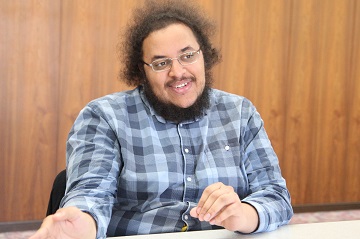
However, I think our class was ‘special’ in the sense that we talked about Japanese grammar a lot, compared to our seniors and juniors. Yes, I think we were the ‘odd ones’ (laughter). Even after coming to Japan, people always ask me “What makes you like Japanese grammar so much?” To me, Japanese grammar is like an interesting puzzle. For example, Japanese transitive and intransitive verbs are difficult to learn. But once you discovered the embedded rules, it makes learning very much easier.
What do you think of the classes in HU?
Now, I think “onomatopoeia” is difficult. For example, expressions such as “kyoro kyoro” (used to express someone “looking around restlessly”) and “jiro jiro” (meaning “to stare intensely at someone”). I can understand the meaning when others use such expressions, but when it comes to using it, I don’t know what kind of expression I should use in my statement. Japanese people use a lot of these expressions. So I believe if I master the usage of this expression, my Japanese will be more natural. I am working hard on that now but I still have a long way to go.
I have a few friends from Sweden who came to study in universities in Tokyo and Kyoto under the same program, and we exchange information about classes and assignments through a group chat. Through our chat, I could really feel that the quality of education offered in HU is so much higher compared to them. They were always saying “Give me something more difficult!” and I felt like telling them “Come to HU, then”.
Do you work part-time?
Yes, I teach English to 5 junior high and high school students. I was born in Sweden but I speak English to my father who is from Africa, so English is like my mother-tongue.
What do you think of the English spoken by Japanese people?
It depends, actually. But frankly speaking, I find most Japanese generally are not good in speaking English. I understand what they are trying to say, but the sentences are odd. Also, whenever they want to invite someone to join the fun, they always use “Let’s”.
Well, this is just my opinion, but I find this expression to be very ‘Japanese’. For example, when inviting someone to go mountain climbing, they say “Let’s go mountain climbing”. But for us, we’ll say “Come go mountain climbing with us!” Using “Let’s” is not wrong but I find the tone of invitation not strong enough. Instead, if we use “Come…” and imperative form when inviting someone, it shows the proactive intention of the person like “Come on, I want you in the fun!”. And this expression shows the friendliness of the person as well.
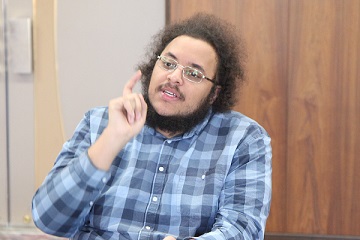
Also, there are many synonyms in English. If one wants to speak better English, it is advisable to use different words according to the situations. There are many words of compliment like “Good”, “Excellent”, “Great”, “Amazing”, “Superb” and so on. But Japanese people tend to use the same words over and over again, and because of that their way of expressions looks monotonous. In order to be able to speak more expressively, I think Japan should put more emphasis on “speaking” practice in English classes. Well, it’s just my opinion.
Thank you for your frank comment. By the way, what do you usually do outside the campus?
I watch a lot of Japanese dramas and go to live music concerts too, but I especially like watching sport games. Last year I went to the Japanese professional baseball championship. I was cheering for the local Hiroshima Carp, but apparently Softbank Hawks was stronger. Carp was aggressive in their offense but the opposing team deservedly won with their strong defense. I was impressed with the Carp fans for celebrating the victory of the rival team even after they lost the game. When watching sport games in Europe or America, we usually cheer by saying “Knock (the rival) down!” But in Japan, the fans respect the opposing team as well. I think that’s beautiful.
What is the goal of your study abroad here in Japan?
No doubt my main goal is to improve my Japanese language ability. But for now, I hope to win acceptance from people around me.
Could you be more precise?
For example, when a European like me writes kanji (Chinese characters), Japanese people will be so impressed and praise me saying “Wow! You write kanji? You write really well!” And sometimes I hear people gasp in surprise when I answered the question given by the teacher correctly. Sometimes even when I speak in Japanese, there are people who insist on speaking English to me. I assume this is because many people still do not accept the fact that there are foreigners who speak Japanese fluently.
It is not only me, but also other students from the western countries and African countries. I would like to prove to the people in Japan that people like us work really hard and achieve what we are today. I would like to tell them “I speak Japanese. I am majoring in Japanese and I am studying on the transitive and intransitive verbs in Japan!” Now this feeling highly motivates me to strive harder.
Do you have any advice on study abroad to the students in your country?
Accept and respect other cultures. Especially since there are many foreign students in HU, we should try to understand the differences in one another’s culture. We don’t look only at the differences but the similarities as well. It is important to acknowledge the differences, but focusing on the differences only may not be good in forming relationship with others. Another thing is, to cook one’s own meal. It is cheaper than buying food from the convenience stores or eating out in the restaurants. Not only when studying abroad, I think we must cook our own meals in order to live a proper life. It can be just a simple dish like pasta, salad or beef bowl, anything! My major was chemistry and cooking is like doing experiments, I find it really fun. Lastly, manage one’s own money. I think that’s very important.
Could you tell us about your dream?
I would like to become a teacher. Where and teaching what, I haven’t decided yet. I may teach chemistry in Sweden, or maybe become a Japanese Language teacher in Japan. I used to work part-time as a substitute schoolteacher in Sweden. I realized then that most teachers teach their students whatever is written in the textbooks only, nothing about the wisdom of living at all. For now, I would like to gain extensive experience in life and based on those experiences, I will define my motive of teaching and become the kind of teacher I aim to be.
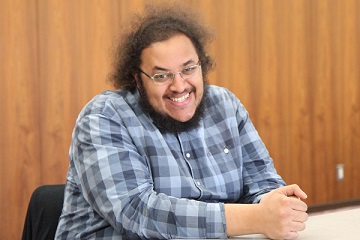
I pray that your dream will come true. Thank you very much for your time today.
It’s my pleasure. Thank you too.
Photo Gallery
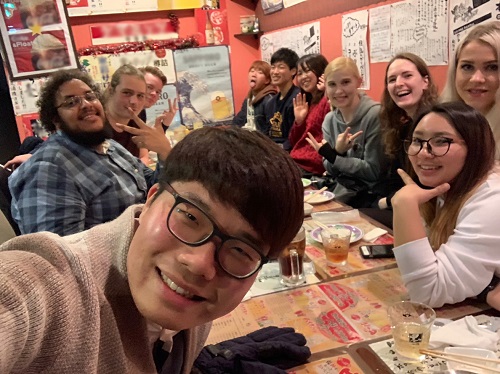
Gathering with friends
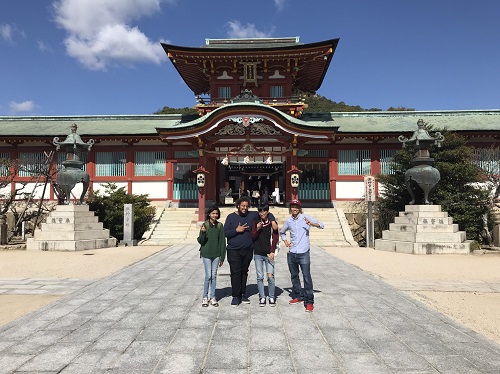
Hofu Tenmangu Shrine (Yamaguchi prefecture)
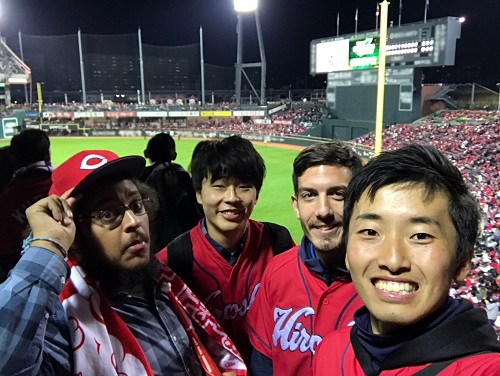
Watching Game 6 of the 2018 Japan Series (Baseball). Our local team Carp lost the game, but we had so much fun! (Mazda Zoom-Zoom Stadium Hiroshima)
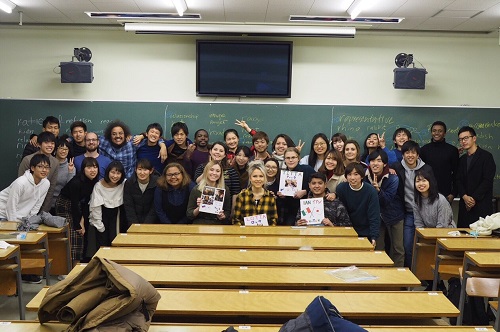
Farewell party for the members of “Talk x Talk” English conversation circle returning to their home countries. Hope to see you guys again!
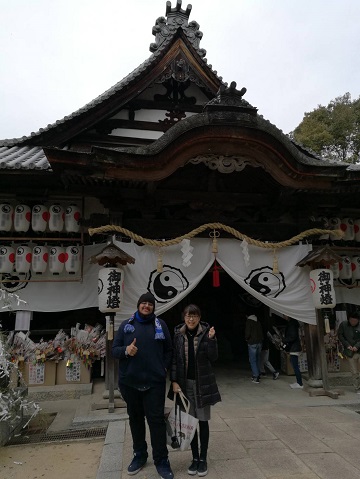
New Year’s shrine visit with my host mother (Kure city)


 Home
Home